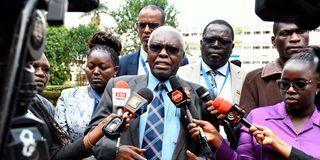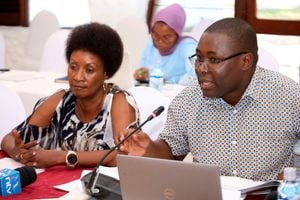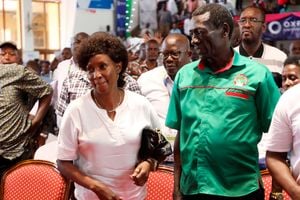
Basic Education Principal Secretary Belio Kipsang with Education Cabinet Secretary Ezekiel Machogu during the release of the 2023 KCPE results on November 23.
When schools reopen on January 8, primary school headteachers across the country will take over Early Childhood Development Education (ECDE) centres from county governments as well as retain leadership of junior schools in a new school setup that expands their role in the management of basic education.
This is among recommendations of the Presidential Working Party on Education Reforms (PWPER) , that proposed repealing of the Early Childhood Education Act to allow the transfer of the provision of early childhood education to the Basic Education Act.
According to the PWPER, basic education starts from pre-primary to senior school.
ECDE is currently a devolved function. But, starting next year, the 47 governors will no longer be in charge.
“The Ministry of Education, Council of Governors and the Teachers Service Commission to develop an intergovernmental agreement for hiring and remuneration of pre-primary teachers. This will ensure harmonisation of pay for all pre-primary teachers and that the TSC manages the payroll based on an allocation from Parliament while the Counties hire the pre-primary teachers,” the taskforce recommended on the issue of who will pay and hire pre-primary teachers who will now be under the new powerful headteachers.

Presidential Working Party on Education Reform Chairperson Prof Raphael Munavu addressing media during public hearings on education reforms held at the University of Nairobi (UoN) Taifa Hall on November 11, 2022.
And even as Kenyans usher in the New Year ahead of schools reopening, parents, learners and other education stakeholders will be met by a new primary school setup named comprehensive schools.
The comprehensive schools will comprise pre-primary, primary and junior school, placing a heavier administrative workload on headteachers.
Education Cabinet Secretary Ezekiel Machogu said that from January, all levels of learning from pre-primary, primary to junior school, under the comprehensive school system, will be managed as one and headed by a headteacher.
“The comprehensive schools begin in January, headteachers will be in charge of pre-primary up to Grade 9. These are some of the recommendations by Kenyans and education stakeholders,” said Mr Machogu during an interview.
He urged parents and guardians to embark on preparing learners to ensure they are ready for the 2024 school calendar, with first term commencing on January 8.
Form One students will, however, report to their new institutions on January 15.
The CS further urged all education field officers to report to their duty stations on all working days to assist parents with necessary preparations regarding the 2024 school calendar.
Also Read: Education for the rich - Concern as thousands set to miss out in new varsity funding model
Recently, primary school managers through their Kenya Primary Schools Head Teachers Association said the comprehensive school set up offered a seamless transition from pre-primary to primary and junior school levels.
“Integration of different levels allows for a more holistic approach to education, addressing the cognitive, social and emotional development of learners throughout their formative years,” said the association’s chairman, Mr Johnson Nzioka, adding that continuity can enhance the quality of learning experiences and facilitate a smoother changeover academically.
Mr Nzioka said a single leadership may allow for more consistent management and coordination across the levels, ensuring alignment in school policies, curriculum programmes and teaching methods.
He further added that consolidating resources across the levels will allow for the sharing of facilities, staff and instructional materials, enhancing cost savings and efficient resource allocation in the long run.
“Teachers and administrators across the levels can collaborate more closely, sharing best practices and collectively working towards common educational goals,” said Mr Nzioka.
He said the integration will ease the assessment of learners’ overall performance and progress across the levels, particularly if the data sets and monitoring systems are well synchronised under one administrator.
However, Mr Nzioka said there will be a heavier administrative workload that calls for enhanced coordination amongst the various stakeholders.
He further urged the state to engage parents and the community on the comprehensive school setup that may require different strategies and their active involvement and support.
Supporting reforms
The headteachers further urged the state to provide the necessary resources, including materials and facilities for the education of all learners, including those with special needs as well as those from diverse cultural backgrounds.
Meanwhile, Mr Machogu lauded stakeholders for supporting the education sector in 2023, enabling the state to stay on a firm trajectory during the roll-out of various reforms.
He said the country’s education system is undergoing a paradigm shift that has seen the gradual phasing out of the 8-4-4 system and introduction of the 2-6-3-3-3 system, popularly known as competency-based curriculum (CBC).
Grade 7 students, who are the pioneers of CBC, will be joining Grade 8 in January.
“More than 90 per cent of the submissions received by the PWPER from various stakeholders recommended that junior school (JS) be hosted in existing primary schools. Only five per cent of the submissions recommended the hosting of JS in existing secondary schools, while two per cent suggested new schools for JS,” said Mr Machogu.
He said Grade 7 and Grade 8 learners would experience psycho-social challenges in settling down and integrating with secondary school learners, who are relatively much older.
However, he said the government has taken proactive steps to ensure that junior schools have the required infrastructure.
He said this financial year, Sh3.9 billion has been earmarked for the construction of classrooms for JS, and a further Sh9 billion will be provided by the World Bank, to support the construction of 9,000 classrooms.
“This, together with support from the National Government Constituency Development Fund, will ensure that we will be ready with the required 15,021 classrooms for Grade 9 learners by 2025,” he added.
He said the government is working on the implementation of the various recommendations that the PWPER made.
Lack of capacity
Early this year, President William Ruto explained the reasons for domiciling JS in the existing primary schools, saying this was due to lack of capacity in secondary learning institutions in both private and public schools.
President Ruto said Kenya has nearly three times more primary schools than secondary institutions. Both private and public primary schools today stand at 32,000 while secondary schools stand at 10,000.
“This mismatch will continue to frustrate our efforts to deliver a 100 per cent transition to secondary education. This is one of the reasons that may have informed the working party towards hosting JS in our primary schools,” said the President on December 6, 2022.












